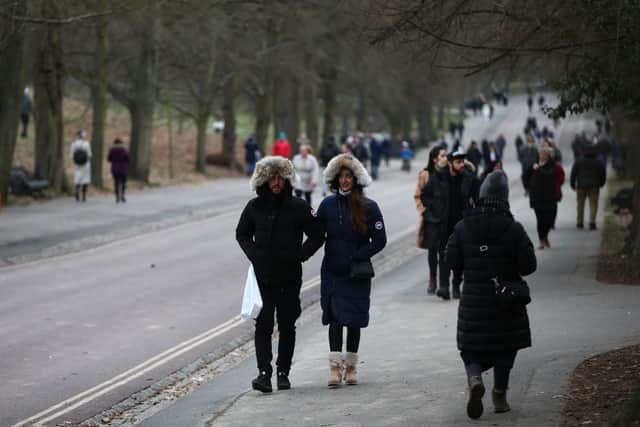UK weather: millions cannot afford to heat homes as ‘dangerously cold’ snap sets in
and live on Freeview channel 276
More than three million low-income households cannot afford to heat their homes as a bout of cold weather grips the UK, posing a risk to their health, new research warns.
The UK Health Security Agency (UKHSA) has issued a cold weather alert in England and urged vulnerable people to warm their homes to at least 18C, wear extra layers and eat hot food to protect against the plummeting temperatures.
Advertisement
Hide AdAdvertisement
Hide AdIt comes as the Met Office warns that overnight temperatures could drop as low as -10C by the end of the week as an Arctic blast hits the UK. Several weather warnings for snow and ice are already in place for parts of Scotland, Northern Ireland, Wales, the east coast and south-west of England over the coming days.
Forecasters have also extended a yellow weather warning into Thursday and Friday (8-9 December), with ice expected in coastal and northern England, and snow and ice in northern Scotland. Motorists could face treacherous conditions on the roads, while some roads and railways are likely to be affected with longer journey times expected.
Met Office chief meteorologist Steve Willington said: “As an Arctic maritime airmass settles across the UK, temperatures will fall with widespread overnight frosts, severe in places, and daytime temperatures only a few degrees above freezing.
“However, the cold air from the Arctic will also bring brighter conditions, with some dry, sunny spells, particularly away from the coast and where winds are light it could feel pleasant in the sunshine. Some patchy freezing fog is also likely.
Advertisement
Hide AdAdvertisement
Hide Ad“Showers will turn more wintry with an increasing risk of snow as the week progresses, particularly in coastal areas or over higher ground. There will be widespread frosts with temperatures falling to as low as minus 10C overnight in isolated spots by the end of the week.”


2.5 million homes going without food or heating
Findings by the Joseph Rowntree Foundation suggests that some 710,000 households are unable to pay for warm clothing, heating and food, while a fifth of all low-income homes - 2.5 million - are going without heating and food.
The survey of 4,251 people in the bottom 40% of incomes also suggested that around 4.3 million have reduced the amount they spend on heating. It also found that many families are already behind on their bills, owing more than £1,600 on average, and around 2.4 million households have borrowed money or used credit to afford their bills so far this year.
Rachelle Earwaker, senior economist at the Joseph Rowntree Foundation, said: “The government must see that families won’t be able to get through the winter on the current levels of support.
Advertisement
Hide AdAdvertisement
Hide Ad“For hundreds of thousands of households it’s not a choice between putting the heating on or not. Our research shows they can’t afford anything recommended to protect themselves from the effects of plummeting temperatures.
“We’re still experiencing historically high inflation and the prices of essentials are still soaring. Energy bills, while capped, are still almost double what they were last winter. Housing shortages, rising rents and mortgage payments are overburdening budgets across the country.”
“The dangerously cold weather on the horizon is cause for concern. People are being forced to wager their financial health and whether they can afford more debt, against their wellbeing without sufficient heat, clothing or hot food.”
Ms Earwaker also said the basic social security level is “woefully below” the level that would allow people to afford essentials and the Foundation is now calling on the government to change Universal Credit and increase the basic rate of support.
Advertisement
Hide AdAdvertisement
Hide AdA government spokesperson said: “Our priority will always be to support the most vulnerable and we recognise that people are struggling with rising prices which is why we are protecting millions of those most in need with at least £1,200 of direct payments and providing households with £400 towards energy costs.
“Our immediate support also includes our Energy Price Guarantee, saving around £900 for a typical household over winter and our Household Support Fund is helping people with essential costs. Meanwhile the Chancellor recently announced a further extensive cost of living package, ensuring those most in need are supported next year as well as this.”
Comment Guidelines
National World encourages reader discussion on our stories. User feedback, insights and back-and-forth exchanges add a rich layer of context to reporting. Please review our Community Guidelines before commenting.
